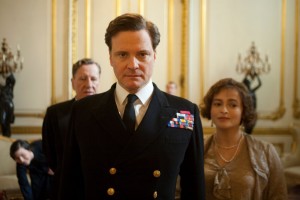THE KING’S SPEECH: 4 STARS
 If you think a movie about a soon-to-be-monarch trying to overcome a debilitating speech impediment sounds dull, think again. Imagine a royal “Pygmalion” brimming with wit, pain and perseverance. It’s a moving and even occasionally exciting story that climaxes not on a battlefield or boardroom but with two men, one microphone and an historical speech.
If you think a movie about a soon-to-be-monarch trying to overcome a debilitating speech impediment sounds dull, think again. Imagine a royal “Pygmalion” brimming with wit, pain and perseverance. It’s a moving and even occasionally exciting story that climaxes not on a battlefield or boardroom but with two men, one microphone and an historical speech.
Colin Firth plays the man who would be king, the Duke of York who later became King George VI when his brother Edward (Guy Pearce) abdicated the throne in 1936 and ran off with the twice divorced Wallis Simpson. A chronic stutterer he tried every cure going, including smoking, which was thought to “calm the nerves and relax the larynx,” and trying to speak with a mouthful of marbles. He has no success until he meets Lionel Logue (Geoffrey Rush), an Australian voice coach with some unorthodox methods to help untie Albert’s tongue. Befriending the royal, he delved deep, looking for the cause of the vocal tics rather than simply working on the mechanics of uninterrupted speech. Slowly the stiff-upper-lipped Albert opens up, and with the support of his wife (Helena Bonham Carter) and his tutor / confessor, he confronts the psychological roots of his problem.
Since debuting at the Toronto International Film Festival in September there has been heavy Oscar buzz surrounding “The King’s Speech” but I think the pundits are getting it wrong. Colin Firth has been touted as a front runner in the Best Actor category, and he certainly has the film’s showiest role, but for me, the most effortless performance comes from Geoffrey Rush who brings a warm naturalism to his role.
Either way, the movie is anchored by two terrific performances and is most effective in its quiet moments—the look on Firth’s face when his daughters stop calling him father and begin calling him Your Majesty, the film’s climatic speech and Albert’s heartfelt acknowledgement that Lionel, a commoner, is his best friend. Those underplayed moments are really were the gold is.
“The King’s Speech” is, of course, about more than a speech impediment. It’s about someone who didn’t want to be king reluctantly accepting his duty, and not only finding his voice, but also giving a voice to England during the Second World War.
